Meta Description: Explore how AI mental health apps can ethically support youth well-being in 2025, with practical insights on benefits, concerns, and choosing the right digital tools.
Picture this: Your teenager comes home from school, clearly stressed about an upcoming test, and instead of bottling up their anxiety, they open an app on their phone. Within minutes, they’re engaging with an AI-powered mental health tool that helps them process their feelings and develop coping strategies. Sound too futuristic? Well, we’re already there – and the conversation about whether this is helpful or harmful is just getting started.
As a parent who’s watched my own kids navigate the unique pressures of growing up in our digital age, I’ve been fascinated (and admittedly a bit nervous) about the rise of AI mental health apps. The question isn’t whether these tools are coming – they’re already here. The real question is: can we use them ethically to genuinely support our young people’s well-being?
The Current State of AI Mental Health Support
Let’s be honest – traditional mental health care for youth has some serious gaps. In 2025, we’re seeing initiatives like the JED and AASA District Mental Health Initiative expanding from pilot programs, but the reality is that many young people still struggle to access timely, affordable mental health support.
Enter AI-powered mental health apps. Apps like Wysa and Youper are gaining traction at record speed, with millions of people already trusting these apps with their most intimate struggles. These aren’t just simple mood trackers anymore – we’re talking about sophisticated AI systems that can detect early signs of mental health challenges and provide personalized interventions.
The technology is genuinely impressive. Current trends reveal AI’s transformative potential, with applications such as early detection of mental health disorders, personalized treatment plans, and AI-driven virtual therapists. Some apps can even analyze smartphone usage patterns to gain insights into users’ mental health states – though that capability raises its own set of questions about privacy.

The Promise: Why AI Mental Health Tools Matter for Youth
Here’s what gets me excited about this technology: accessibility. Traditional therapy can cost hundreds of dollars per session, and waiting lists for youth mental health services can stretch for months. AI mental health apps offer 24/7 support that fits in your pocket – and that’s potentially game-changing for young people who need help right now, not next month.
I recently helped my friend’s daughter find resources when she was struggling with anxiety attacks during finals week. While we were working on getting her connected with a counselor, having an AI mental health app available provided immediate coping strategies and helped her feel less alone during those 2 AM worry spirals we all remember from our school days.
The personalization aspect is particularly compelling for youth. Apps like Mindstrong Health combine AI with smartphone usage patterns to research mental health conditions such as depression and anxiety, offering valuable insights into day-to-day experiences. This means the support can adapt to each individual’s unique patterns and needs – something that’s especially important for young people who might not yet have the vocabulary to articulate exactly what they’re experiencing.
For parents looking to support their teens’ mental wellness journey, I’ve found that having a high-quality journal can complement digital tools beautifully. The Rocketbook Smart Reusable Notebook from Amazon has been a game-changer for our family – it allows kids to write freely about their thoughts and feelings, then digitally save important insights while erasing pages for privacy. It bridges that gap between traditional journaling and digital wellness tracking.
The Concerns: Navigating Ethical Minefields
But let’s pump the brakes for a moment. As AI transforms mental health care, questions about app efficacy, privacy, and ethical design highlight the need for rigorous validation and oversight. When we’re talking about our kids’ mental health data, we can’t just cross our fingers and hope for the best.
The privacy concerns are real and significant. The privacy of medical data is considered part of the patient’s autonomy to control their data, and medical data’s sensitivity typically necessitates greater consideration. Think about it – these apps often know more about our teenagers’ inner lives than we do as parents. What happens to that data? Who has access? How is it protected?
Then there’s the bias issue. If the training data are biased, the AI system risks reproducing that bias. This is particularly concerning when we consider that mental health experiences can vary significantly across different cultural, socioeconomic, and demographic groups. We need to ensure these tools work fairly for all young people, not just those who fit a narrow demographic profile.

Finding the Balance: Ethical Implementation in Practice
So how do we move forward responsibly? AI mental health apps may offer a cheap and accessible way to fill gaps in the overstretched U.S. mental healthcare system, but ethics experts warn that we need to be thoughtful about how we use them, especially with children.
Here’s my practical take: these tools work best as supplements to, not replacements for, human connection and professional care when needed. I’ve seen families use AI mental health apps successfully as a first step – helping young people identify patterns, develop initial coping strategies, and build confidence to seek additional support when appropriate.
The key is transparency and education. Young people need to understand how these tools work, what data they’re sharing, and what the limitations are. It’s not unlike teaching them about any other aspect of digital literacy – we want them to be informed users, not passive consumers.
For families serious about creating a supportive environment for mental wellness conversations, I highly recommend the Therapy Games for Teens card deck from Amazon. These conversation starters have been incredibly helpful for opening up dialogue about feelings, coping strategies, and when it might be time to seek additional support – whether from an app, a counselor, or both.
Choosing Wisely: What to Look for in AI Mental Health Tools
If you’re considering AI mental health apps for the young people in your life, here are some non-negotiable criteria I’ve learned to prioritize:
Evidence-based approaches: Look for apps that use therapeutic techniques with proven track records, like cognitive behavioral therapy (CBT) or mindfulness-based interventions. The AI should be enhancing these approaches, not replacing them with untested methods.
Clear privacy policies: I know, I know – nobody actually reads terms of service. But for mental health apps, it’s worth the time. Look for clear explanations of how data is used, stored, and protected. Red flags include vague language about data sharing or policies that seem to change frequently.
Professional oversight: The best AI mental health apps involve actual mental health professionals in their development and ongoing monitoring. This isn’t just about having a PhD listed on the team – look for evidence of ongoing clinical input and validation.
Crisis support: In 2025, the trend is toward AI as both a scalable mental health aid and a clinical decision support tool, extending the reach of care while augmenting the work of human therapists. Any app targeting youth should have clear protocols for crisis situations and direct connections to human support when needed.

The Road Ahead: Building Ethical AI Mental Health Support
Looking forward, I’m cautiously optimistic about where this technology is heading. Conversational AI is emerging as a promising digital technology for mental health care, though its use raises ethical concerns that need comprehensive consideration. The key is that we’re having these conversations now, while the technology is still evolving, rather than trying to retrofit ethics after the fact.
What gives me hope is seeing young people themselves become advocates for responsible AI development. They understand both the potential benefits and the risks in ways that sometimes surprise us adults. Their input is crucial as we shape how these tools develop.
For parents wanting to stay informed and engaged in these conversations, I’ve found that having reliable resources makes all the difference. The “Complete Checklist for Digital Wellness and Safety for Connected Families” handbook available on Amazon provides practical frameworks for discussing technology use, privacy, and mental health with kids of all ages. It’s become my go-to resource for navigating these complex topics with confidence rather than fear.

Taking Action: Your Next Steps
So where does this leave us as we navigate 2025 and beyond? First, let’s acknowledge that AI mental health tools aren’t going anywhere – and that’s probably a good thing, given the scale of youth mental health challenges we’re facing. The question is how we use them thoughtfully.
Start with education – both for yourself and the young people in your life. Understand what these tools can and can’t do. Have honest conversations about privacy, data sharing, and the importance of human connection in mental health support.
If you decide to try an AI mental health app, treat it as one tool in a broader toolkit. Combine it with other wellness practices, maintain open communication with trusted adults, and don’t hesitate to seek professional help when needed.
Most importantly, remember that technology is only as good as the intentions and oversight behind it. By staying engaged in these conversations and demanding ethical development practices, we can help ensure that AI mental health tools truly serve our young people’s best interests.
The future of youth mental health support will likely include AI – but it doesn’t have to be a future we stumble into blindly. With thoughtful consideration, transparent communication, and a commitment to putting young people’s well-being first, we can harness this technology’s potential while protecting what matters most.

Ready to explore how AI can ethically support the young people in your life? Start with education, prioritize privacy, and remember – the best technology enhances human connection rather than replacing it. What steps will you take today to ensure the young people you care about have access to safe, effective mental health support?
This article contains affiliate links to products that may support your family’s mental wellness journey. As always, consult with healthcare professionals for personalized mental health guidance.




